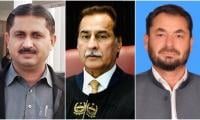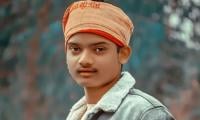As mentioned in the previous part of this series, Afzal Tauseef was an indomitable fighter for democracy in Pakistan. She was born in 1936 in East Punjab and in 1947, most of her family members were killed in the throes of Partition. She came to Balochistan were her father was posted, and then she moved to Lahore.
From General Ayub Khan to General Zia, she battled for the restoration of democracy in the country. One of her short stories is 'Pacheeswan Ghanta' (the 25th hour) in which she exposes the selfishness of most people who try to remain aloof from what is happening in society. “This was the same person who used to say, with a smug face, ‘I am content with my life because I always think about myself and my hereafter’. Well, even a goat thinks the same way; while ruminating, its face is also as blank and smug.”
Moving forward, Afzal Tauseef writes: “But you say the Ravi is dry and full of sand; yes, the sand moves around in the Ravi, then what? I wanted him to keep talking. If the water in the Ravi had not dried up, seasons would have alternated: summer, winter, fall and spring. Now, what do we have? The scene of a wasteland. Had it not been a wasteland, we could be talking about the upcoming season…You have also played a role in making this wasteland.”
In 2019, when we see the wasteland around us, we should remember that Afzal Tauseef had forewarned us about this impending wasteland 50 years ago. Here wasteland does not mean destruction of physical infrastructure; we do have tall edifices in our cities. It is the educational and intellectual wasteland we see around us; it is the result of suppressing opinions, and curbing the freedom of expression. But our state and its ruling elites neither bothered about it then, nor are they concerned right now. They are only interested in protecting their own interests.
If the rest of the country turns into a wasteland, so be it. They are more engaged in the narratives of ‘national interest’; producing songs, delivering speeches, and staging dramas. This is almost the same wasteland that TS Eliot talked about, against the backdrop of the First World War in Europe; but even then his caution was not heard, and within 20 years Europe was thrown into another war.
'Siyah Aasman' (Black Sky) is a short story by Ikramullah, who was neglected by nearly all critics of Urdu literature, until M Umar Memon and Faruq Hasan translated him into English. 'Siyah Aasman' is also a link in the chain of resistance literature in Urdu. The story begins with the narrator climbing up the stairs of an apartment building. He keeps climbing but neither does the required apartment come in sight, nor do the stairs end; he just keeps climbing hundreds of steps.
Ikramullah writes, and I translate: “I touched the iron ring around my head; it was so cold and narrow that it was chafing my forehead. Metals shrink in cold, don’t they? ...I don’t know why all men and women have these self-tightening iron ring around their heads; the rings are getting narrower and narrower day by day. Now, children have their entire heads enclosed with iron frames; and newborns come into this world already encased with iron sheathing around their heads.”
Ikramullah wrote this short story decades ago but even now our education system and media are being used to circumscribe the brains of our children. Ikramullah continues: “In the next 15 to 20 years, god willing, nobody will complain of the narrowness of the iron rings, because by that time the brain of every complainant would have fallen out of the cracked skull.” How prescient was Ikramullah; can we still doubt the veracity of resistance literature?
Similarly, look at another short story by Umrao Tariq, 'In-camera Proceeding'. Umrao Tariq (1932 – 2011) was born in UP, India, and his family moved to East Bengal after 1947, from where he moved to Karachi and joined the police service. He was an eyewitness to many atrocities committed by state officials, so his stories have that ‘real-time’ touch in them.
In his story 'In-camera Proceeding', a case is being heard behind closed doors. While reading this you recall Kafka’s novelette 'The Tria',; but in Umrao Tariq’s story the case is against a writer. “My lord, the accused writer has started writing stories that pinpoint such evils in society that should remain covered for the benefit of the entire social setup.” According to the court verdict, an announcement is made in the city that no vendor or shopkeeper should sell paper, pen, or anything related to writing to the accused writer, failing which exemplary punishments will be given. The writer cuts his fingers and starts writing with his blood.
“My lord, blood is something that can turn white, or at the most you can spit blood; but writing stories with blood is against our tradition and tantamount to rebellion against the established norms. My lord, the accused has committed the crime of treason.” At the end of the story, Umrao Tariq has the wife of the accused say the following: “My lord when my husband’s tongue was chopped, he stared writing stories. His pen was confiscated. He dipped his fingers in blood, then his fingers were cut off too. And now once again, it has been recommended that his tongue be chopped.”
At the end of the trial, the court reserves its verdict till the doomsday. In today’s Pakistan, the way freedom of expression is being curtailed and journalists are being eliminated, threatened, and even their family members targeted – all this points to just one goal: to stop people from writing. Or, if they write, they should write only that which is permitted; in which mainstream narratives are not challenged. For example, don’t ask how and why the murderers of an innocent family in the Sahiwal tragedy could be acquitted of the crime, giving them the benefit of the doubt.
Or how someone accused of killing hundreds of people in police encounters, saunters around with his head upright. Or why those who raise questions at the murder of Arman Luni are silenced. Writing against all this, is precisely resistance literature.
There is a symbolic story by Intizar Hussain, 'Subh ke Khush Naseeb', translated into English as 'The fortunate Ones of the Morning' by Masud Qureshi. In this story, a train is stalled for hours in wilderness and doesn’t budge an inch. The engine spews plumes of smoke but the train doesn’t move at all. The smoke engulfs the stationary train and the passengers are feeling suffocated but the train doesn't move and the smoke doesn't clear.
Intizar Hussain writes, and the translation is mine: ”I recalled the moment when we boarded the train. After entering the train we had a feeling of security and pitied those who were left behind. Now they must be feeling pity at us. The good fortunate has been so quickly swapped with bad luck. Those who felt fortunate in the morning, are now the hapless ones. They are better off now who missed the train.”
There is another story by Anwaar Ahmed, 'Shehr ka Pehla Muhibbe Watan Bachcha’ translated as 'The first child patriot of the city' by Zafar Hussain Zaidi. Anwaar Ahmed is a renowned critic of Urdu literature, a short story writer and professor. His book, 'Urdu Afsana, Ek Sadi ka Qissa' (Urdu short story: a tale spanning a century) has been acclaimed widely. We will discuss his story in the next and last part of this series.
The writer holds a PhD from the University of Birmingham, UK and works in Islamabad.
To be continued
Email: mnazir1964@yahoo.co.uk
A woman walks past a building of the International Monetary Fund. — AFP/FileThe annual and spring meetings of the...
Late Benazir Bhutto's daughter Asifa Bhutto Zardari addresses the Christian community in Bihar Colony on January 23,...
Representational image. — PexelsWater is an important scarce natural resource that is required for several everyday...
Pakistani employees of online marketplace company Kaymu at work in Karachi. — AFP/FileThe true spirit of development...
India uses Afghanistan as a backstage area to carry out terrorist attacks against Pakistan
Another report by the Pakistan Institute of Peace Studies states that 78 per cent of attacks have been carried out by...







